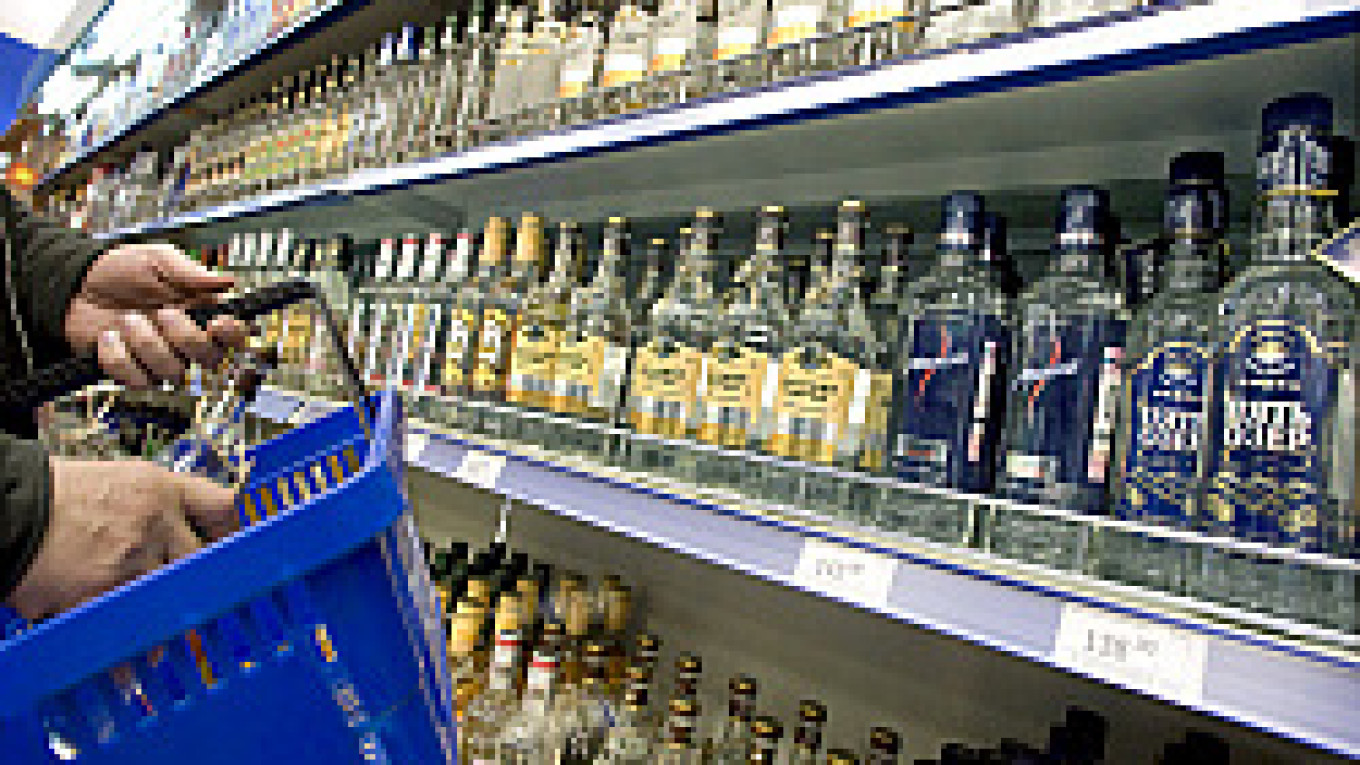The sale of illicit vodka is expected to account for nearly half of all vodka sales countrywide this year as people look for cheap, untaxed alcohol as their salaries shrink amid the economic crisis.
"Illegal vodka production has always been a problem in Russia, and it will be even worse this year," said Vadim Drobiz, spokesman for the Union of Alcohol Market Participants.
While 12.1 million liters of vodka was produced legally last year, 17 million liters was sold in stores, according to the State Statistics Service. This suggests that the illegal vodka market totaled 4.9 million liters, or 28.8 percent of all sales.
The proportion of illicit sales will grow to a projected 43 percent this year, Renaissance Capital said.
In an early sign that illicit sales are already taking off, legal vodka production plunged by 21 percent in January, compared to January last year, the State Statistics Service said. Vodka production fell by 7.6 percent for all of 2008.
"Sales aren't down, but production is falling," said Pavel Shapkin, chairman of the National Alcohol Association. "This indicates that the state is losing to crime and the consumer is encountering products that are not properly regulated."
The government has begun to target the problem, and on Jan. 11 President Dmitry Medvedev handed regulation of the domestic alcohol market over to a new state body. The new system offers more cohesive oversight of a market previously regulated by multiple organizations, including the Finance Ministry, the Agriculture Ministry and the Economic Development Ministry.
Still, industry players say the state must lower excise taxes to start truly curtailing the black market. Excise taxes on all types of alcoholic beverages rose by a total of 10 percent in 2008. Now, a standard half-liter bottle of vodka carries an excise tax of 38 rubles, while a liter of high-end liquor has a tax of 191 rubles.
"The higher that the excise fees on alcohol are raised, the more the industry will be turned over to the black market," Shapkin said. "We asked the state to reduce the level of alcohol fees just for this year but still have not heard an answer."
Production of alcoholic drinks other than vodka also started to fall in January, with wine down by 21.8 percent and beer by 7.2 percent, according to the State Statistics Service. The sole exception was cognac, which has enjoyed a surge of popularity on the Russian market and saw output increase by 6.9 percent.
A half-liter of illegal vodka can cost 50 rubles, while it should cost no less than 85 rubles if all excise fees are paid. The 35 ruble difference spells bad news for legal vodka producers who are already struggling after distributors failed to make good on payments. Distributors operating on commercial credit usually can repay producers within a 30-day period, but many retailers defaulted on payments in the fall and could not pay back distributors.
"All this led to a partial collapse of the market and a sharp drop in production," said Dmitry Dobrov, spokesman for the Union of Producers of Alcoholic Products, which represents some of the country's largest alcohol manufacturers.
Amid the debt woes, production at Kristall's Moscow vodka distillery, the country's second-largest by output, fell by 32.1 percent in January compared to January 2008.
"Kristall reduced production so sharply that at this point it still remains unclear what will happen to it," said Yekaterina Andreyanova, a consumer and retail analyst at Rye, Man & Gor Securities.
"A lot of alcohol companies are facing difficulties right now," she said. "We are seeing more technical defaults and the bankruptcy of a couple companies."
Kristall officials were not immediately available for comment.
Alexander Mechetin, CEO of Synergy, Russia's second-largest hard alcohol producer, said he was not worried and believed that the government was doing all it could to assist legal producers. He praised Medvedev's decision to create the new state body to regulate the domestic alcohol market.
"All the activities of government are on the right track," Mechetin said in a response to e-mailed questions.
Restaurants and bars are likely to be among the hardest hit by the shift to illicit vodka consumption as consumers reject paying three to five times the wholesale price for drinks.
"More people will choose to drink vodka at home now, like they did during the Soviet times," said Drobiz of the Union of Alcohol Market Participants.
The downturn, however, is hitting equally hard the liquor stores that refuse to sell illegal products.
Svetlana Chinikova, an employee at a liquor store on the Garden Ring, said sales have halved since a year ago. "Customers are buying cheaper drinks and they're drinking less," she said, glancing around the empty store on a recent Saturday evening. "Everyone's scared their money will run away."
A Message from The Moscow Times:
Dear readers,
We are facing unprecedented challenges. Russia's Prosecutor General's Office has designated The Moscow Times as an "undesirable" organization, criminalizing our work and putting our staff at risk of prosecution. This follows our earlier unjust labeling as a "foreign agent."
These actions are direct attempts to silence independent journalism in Russia. The authorities claim our work "discredits the decisions of the Russian leadership." We see things differently: we strive to provide accurate, unbiased reporting on Russia.
We, the journalists of The Moscow Times, refuse to be silenced. But to continue our work, we need your help.
Your support, no matter how small, makes a world of difference. If you can, please support us monthly starting from just $2. It's quick to set up, and every contribution makes a significant impact.
By supporting The Moscow Times, you're defending open, independent journalism in the face of repression. Thank you for standing with us.
Remind me later.


